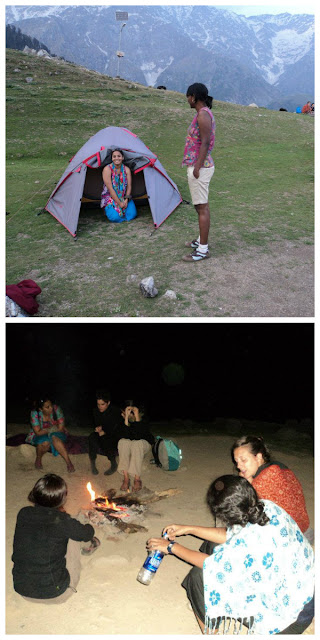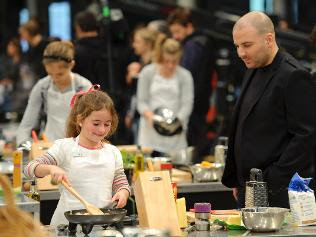My grandmother, is in her late 70s’, but every other month she looks for reasons to travel, making plans that fit her limited budget and medical conditions. My parents are no different. I distinctly remember Amma, heavily pregnant with my brother then, holding a steady smile, while Achan adjusted the focus on his SLR camera. Our last holiday before the baby's grand entry. What I am trying to say is that travel, is in my blood. It doesn't matter when, where, with whom or how I travel – the end, justifies the means.
Not long ago, a friend of mine, Archana, visited Delhi on work. She extended her stay to spend some time with Gowri and me, and that is how the three of us woke up to the view of snow-capped mountains some 2,800 meters above sea level.
 |
| It is a good morning @2,875 meters above sea level |
But that’s the last part of the story; let me start at the beginning.
The three of us, Gowri, Archana and me, boarded the HRTC bus at Kashmiri Gate ISBT in Delhi, and settled in for an uneventful, rickety ride up hill. The bus took us to Dharamshala, from where we traveled further up to Mcleod Gunj. We had not prebooked our hotel, and most hoteliers were reluctant to give rooms to ‘unchaperoned’ Indian women. The willing ones asked for exorbitant dollar rates. We eventually managed to get a neat and clean space at Kunga Guest House, and after breakfast, made an impromptu decision to trek to Triund, a place recommended by my Belgian friend Katrin. We hired a cab that took us to the foot of the hill and from there, our trek began.
We had done some asking around, and knew that Triund was a three hour trek with a magnificent view at the top. This said, I must add that we were largely unprepared for what awaited us. I had chosen to wear a sleeveless cotton top with baggy pants and flip flops, and we were carrying two water bottles, a few biscuits and cash in a small backpack. Five minutes on that dirt and gravel track up hill, we figured that this whole trekking business was not really meant for people who hail autorickshaws for the smallest of distances. This was serious, labour intensive business.
 |
| Virgin trekker, we struggled with each step |
We had just crossed the first of the three milestone cafes, when we were nearly over taken by a group of Israeli women travelers and their dog. They decided to walk with us, and soon we were taking pictures and exchanging stories. In Israel, two years of military services is compulsory for both male and female citizens (with a few exceptions). After the said time, they can choose to continue with the defense forces or take an alternative career. This bunch was taking a year off to see the world before deciding their future, and they were full of questions about India. Emma, the dog, belonged to the owner of the hotel they were staying in, and she had chosen to follow them that morning.
One of the girls, Noa, was feeling a little under the weather and frequently reached for her tissue-roll. She’d blow her nose and carefully pack away the used paper in a packet she carried for this purpose. By 12 noon, the sun was uncomfortably warm and Emma stuck out her tongue. We passed around a bottle of water, and when it was nearly empty, Yale took out her military knife and carefully sliced the bottle into two, before placing one part of it on the ground for Emma to drink. Once Emma had had her fill, the bottle halves were packed away - one kept for later use and the other for when she’d find a waste bin.
 |
| Sharing our worlds with the Israeli backpackers |
Soon they continued on their way, and we promised to meet them at the top. Others, who passed us slowpokes by, encouraged us to keep going. You’re nearly there, they said. With every step the view got better, the air colder and my non-exercised muscles groaned louder in pain. There were times when we debated about turning back. At the second milestone, also known as Best View Café, we flipped a coin to decide.
 |
| We rested, flipped coins and marveled at the view |
Heads we carry on, Tails we go back. Flip. Heads – thrice! So up we went. Walk. Pant. Drink. Climb. Stretch. Walk on fours. Pant again. Climb. Repeat exercise. Until finally, six hours and 15 minutes later, we set the record for the slowest climb ever. No, I am not ashamed; on the contrary, I’m rather proud that I didn't give up.
We were now 2,875 meters above sea level, and the climb had brought us to a level ground from where we got a 365 degree view of the world around – civilization far below that looked like lego toys at a distance, a range of snow-capped mountains, sharp cold winds and a beautiful silence. From one of the three makeshift shops set up in the area, we hired a tent and some blankets for the night.
 |
| Life in the great outdoors |
This was our first experience in the great outdoors, and our understanding about survival in such situations (even though we had all seen Man vs. Wild on Discovery Channel) was limited. Are tents waterproof? Can it stay put if the wind is strong? Wasn't it tied to some pegs on the ground, and didn't water make the soil loose and soggy? Would it therefore fly away, leaving us at the mercy of the elements? Our phones lay mute and reception-less near us. If anything went wrong, help would reach us only in the morning. It was a cold, scary night and my prayers were no longer whispers. (The girls have not stopping teasing me about this since)
I heard someone call my name at a distance and I snapped awake. There was silence. I unzipped the tent, and peeped out. The fury of the previous night had given way to the most beautiful day. Fresh mountain air pricked my nostrils, the grass was green and wet and there were puddles here and there. Eden stood impatiently outside. “It is nearly sunrise, you want to see it or not?” she asked. We crawled out, one at a time. Our traveler friends had with them a camp stove bought in Nepal, and they offered us delicious cups of honeyed tea. Together we watched as the faint rays of the sun gently woke up the mountains.
 |
| A fresh morning in the mountains |
Once again, tissues, tea bags and covers were collected and put away in the carry bag. This time, I asked them why they bothered, especially because no one else in India seemed to think along those lines. “It’s a habit; we always carry an extra bag to collect waste. Back home, everyone goes camping with their family or from school and we are taught to never throw anything out in the wild,” Roni explained. I picked up the biscuit packed I’d dropped and shoved it into my pocket.
The walk down was easier and uneventful. It took us four hours this time, and whenever we passed slow trekkers on their way up, we told them that the memories are sure to last longer than the ache in their legs.
 |
| Returning to civilization |
Nature's beauty cannot really be explained in words, and I'm no Wordsworth to try. So leaving you with images of Triund.
 |
| View from the top |
 |
| The sun between the mountains |
 |
| Lead me, kind marker |
 |
| The walk uphill |













